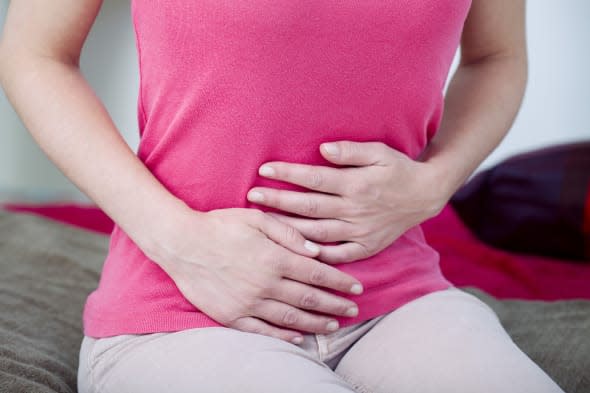How to beat bloat

The reasons for a bloated tummy are many and varied, ranging from lifestyle factors and food choices to potentially more serious conditions. If you regularly suffer from this kind of abdominal discomfort, here are the possible causes to watch out for, and when and why you might need to see a doctor.
Related Searches
What you eat
Some of the biggest bloating culprits are the foods we eat. Otherwise healthy choices such as beans and lentils, and some fruits and vegetables such as prunes, apricots and cruciferous veggies contain sugars and starches that may give rise to bloating and gas as the digestive system has to work hard to break them down. Sweeteners such as sorbitol and fructose are other known causes and are commonly found in processed foods. And finally, while increasing the fibre in your diet will undoubtedly benefit your health, it's important to gradually up your intake. Suddenly taking on a lot more of the whole grain goodness can cause bloating and gas.
How you eat
It may not be just what you eat that's causing your problems - it could be how you're eating it too. To keep bloating at bay, try not to overeat, a common cause of abdominal discomfort, and stick to smaller portions to see if it eases the symptoms. Rich, fatty foods are also often to blame, since fat takes longer to digest than protein or carbohydrates, so ease up on the fats in your diet. Lastly, take your time when you sit down to eat. It takes 20 minutes for your brain to get the message that you are full, which is why it's so easy to overeat. Eat more slowly and your brain will tell you when you are full, thereby reducing the risk of that uncomfortable after-dinner tummy.
It will come as no surprise that most bloating is caused by an excess of air. The digestive system contains gas produced by bacteria as it digests food, but also a sizeable proportion of swallowed air. If it struggles to shift that air through the system effectively, it can lead to a build-up, and consequent bloating. If you regularly suffer, you may want to try avoiding habits that increase the amount of air you swallow, such as guzzling fizzy pop, drinking through a straw or chewing gum.
Food intolerance
If you regularly suffer bloating problems after eating dairy, it may be that you are lactose intolerant. It could be a similar story if you find your bloating is associated with wheat products. Coeliac disease, a condition in which your intestine is unable to absorb gluten found in wheat, barley and rye, is known to cause bloating, although you will likely display other symptoms such as abdominal pain, diarrhoea and fatigue. Bloating is also a common symptom of irritable bowel syndrome (IBS), particularly in women, and it typically becomes a problem in the evenings. Other symptoms include diarrhoea, constipation and stomach cramps. IBS is, however, manageable, so speak to your doctor if you think it may be at the root of your problem. Simple changes to your diet may help to identify trigger foods or drinks, while simple lifestyle changes such as stress reduction or regular exercise can help to ease the problem.
Smoking
Giving up smoking will benefit your health in so many ways, including reducing bloat. The habit has been linked to bloating, heartburn and other digestive problems, so do yourself and your tummy a favour and quit.
%VIRTUAL-AFCSponserAds%
When to seek help
Most of us will experience bloating every once in a while, but when it becomes a long-standing, ongoing problem, it could be a sign of something more serious, including inflammatory bowel disease, parasitic infection, bowel obstruction, liver disease, tumours and some cancers, notably ovarian, colon and stomach cancer. These are rarer causes than most, however, and will usually combine with other symptoms. If you suffer frequent and persistent bloating alongside signs such as unexplained weight loss or gain, pain, nausea or vomiting, or blood in the stools, do pay your doctor a visit as soon as possible, if nothing else, just to give you peace of mind.
Do you regularly suffer from bloating? Have you found the cause? Leave your comments below...




